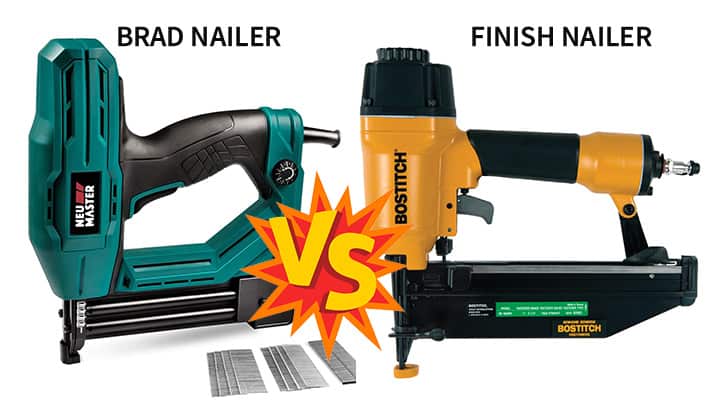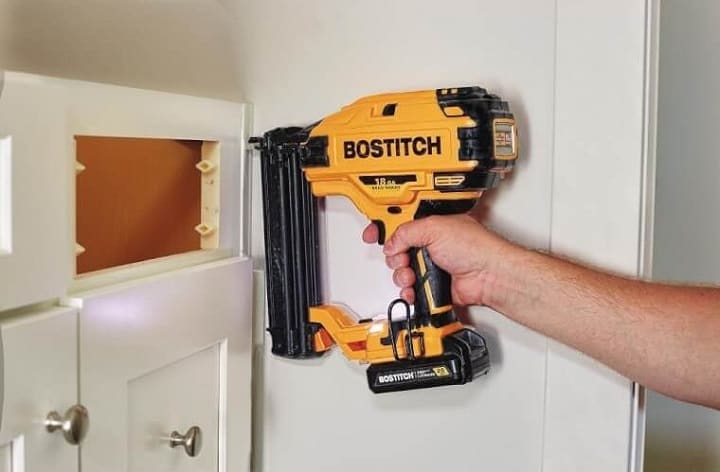If you’re in the market for buying any nailer to make your woodwork easier, you’ve probably found yourself confused between different types of available nailers.
Today, we’ll be comparing the brad nailer vs finish nailer to lessen your confusion and give you a clear vision as to which nailer to go for. Primarily, it comes down to what kind of work you’ll be doing with this and your experience with nailers.

This will be a beginner’s guide, so we’ll be talking about everything to draw a clear comparison between both of these.
In this post we'll cover:
Brad Nailers
It’s a pneumatic or cordless nailer that drives 18 gauge nails into wood. These are very popular amongst average households as they provide a very relevant experience for casual users.
Finish Nailers
It’s a heavy-duty pin nailer that can be found in both pneumatic and cordless designs. These shoot thick nails that are 15 or 16 gauge and can run nails up to 2 inches long.
The finish nailers (like these top choices) are more suited and targeted to professional and heavier works as opposed to simple housework. But it provides enough versatility to be used in more situations.
Uses of Brad Nailers
A brad nailer can be found useful for most common around-the-house repairs and works. Using a brad nailer is not a tough job as they are very user-friendly and thus are pretty suitable for new users and beginners.
Aside from that, the nails that a brad nailer shoots are pretty thin and small compared to other professional-grade nailers. That means it’s not quite suitable for professional and big projects.
However, its small nail size makes it highly relevant in household works such as fixing a chair, making a wooden frame, or making small things out of wood. The nails are so small that they don’t leave marks and traces on the wood once applied.
A brad nailer lacks the holding power to attach large and heavy wood pieces permanently, but professionals may use it temporarily to hold the wood while an adhesive dries. That way, they don’t have to use any extra support for the glue.
Uses of Finish Nailers
Unlike brad nailers, your use case for a finish nailer would be pretty limited. The nailer is typically used and handled by professionals. These nails are thick and can be very long, so they are ideal for permanently holding large and heavy pieces of wood.

You’ll find finish nailers being used for making and fixing furniture, attaching door frames, making wooden structures, and other high-profile woodworks.
Due to the large nails, you shouldn’t use them on small projects. The destructive power of a finish nailer will break apart thin wood pieces and leave large holes.
Finish nailers are very similar to framing nailers; the only difference is that you cannot change the nail angle on a finish nailer.
Main Differences
So now, we come down to compare the two nailers and draw out the differences. The main differences can be found in nail sizes, holding power, price, and speed.
1. Nail Size
The nail size used in nailers is what mainly decides the nailer’s purpose and type. Nail size is measured by gauge, and the larger the gauge number, the thinner the nail.
A brad nailer has a magazine that supports 18 gauge nails. These are relatively thin nails, and they don’t have a pinhead. They can go deep into wood materials and leave a minimal trace.
A finish nailer’s magazine can support nails that are 15 or 16 gauge. These are quite a bit thicker than brads, and they have a small pinhead, and due to that, they cannot go deep into the woods and leave a small hole that needs to be filled in later on.
2. Holding Power
Holding power refers to the strength of a nail and how much weight or pressure it can handle—usually, the thicker and longer the nail is, the greater the holding power.
Brad nails have very low holding power compared to finished nails. They are not suitable for thick and heavy woods, and they can quite easily be removed. However, they are sometimes used to hold wood temporarily.
Finish nails, thanks to them being longer and thicker, have a lot of holding power, and can permanently stick and attach even the heaviest wood pieces.
3. Price
Prices differ from the pneumatic and cordless nailers. The cordless nailers are more expensive.
If you directly compare the brad nailer to the finish nailer, you will find a brad nailer to be relatively cheaper than even the cheapest finish nailer. On top of that, the finish nails cost more than brad nails.
4. Speed
All nailers are meant to replace hammering pins and save you time. Thus, all of them are pretty fast.
However, in terms of speed, brad nailers are faster as they can shoot more nails consecutively thanks to the smaller nail size. Brad nailers also tend to have multiple shooting modes that can increase the speed even further.
Which Nailer Should You Get?
At the end of the day, it does come down to personal preference. To land on a definitive conclusion, you have to figure out what you intend to do with these nailers and make your decision based on that.
If you mostly plan on working on light and small projects, or maybe you’re just a casual guy who enjoys carpentry, you’re going to love the versatility and user-friendliness that the brad nailer provides. A brad nailer would be a good pick for beginners.
However, if you have experience in the wood sector and you have big plans, a finish nailer will satisfy your expectations.
Even if you’re not a professional, making a fence around the house or building a treehouse will require strong holding power, which a finish nailer can comfortably provide.
Conclusion
So, after our extensive conversation on brad nailer vs finish nailer, we hope we have given you a strong enough base to make your decision. You can always go to your local hardware store to try out the nailers and decide which one is for you.
Don’t hesitate to contact us if you have any further inquiries or confusion.
Also read: these are the best electric brad nailers you should check out
I'm Joost Nusselder, the founder of Tools Doctor, content marketer, and dad. I love trying out new equipment, and together with my team I've been creating in-depth blog articles since 2016 to help loyal readers with tools & crafting tips.
